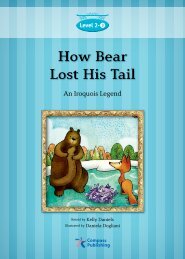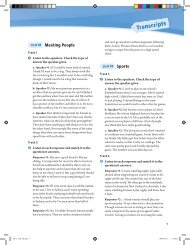Mastering Skills for the TOEFL iBT 2nd - Speaking
Mastering Skills for the TOEFL iBT 2nd - Speaking
Mastering Skills for the TOEFL iBT 2nd - Speaking
You also want an ePaper? Increase the reach of your titles
YUMPU automatically turns print PDFs into web optimized ePapers that Google loves.
TranscriptsQ6 Practice 1Step 1 - LectureW: Today, we enjoy tales where an unexpectedperson becomes <strong>the</strong> hero of <strong>the</strong> story . . . but thisisn’t true of Classical literature. Classicism is <strong>the</strong>period of Western literature that started during<strong>the</strong> time of <strong>the</strong> ancient Greeks and continued untilabout 1800 BCE. All Western literature writtenduring this time has one characteristic in common:<strong>the</strong> heroes of <strong>the</strong> tale are never common orunexpected like today’s heroes, but are alwaysnoble and of aristocratic birth. This is known as<strong>the</strong> aristocratic hero. We see <strong>the</strong> aristocratic heroportrayed again and again in Classical literature.Perhaps one of <strong>the</strong> first and <strong>for</strong>emost examplesof <strong>the</strong> aristocratic hero in Western literature isOdysseus from Homer’s The Odyssey. Odysseusis <strong>the</strong> perfect example of <strong>the</strong> aristocratic hero. He’sa legendary Greek king who spends ten yearstrying to get back home to reclaim his throne. Wecan clearly see that despite <strong>the</strong> trials Odysseusundergoes, his noble nature is never questioned.In fact, Odysseus is favored by <strong>the</strong> Greek gods,and <strong>the</strong> gods of Greek literature hardly ever favoranyone that is not of noble birth. Only aristocraticpeople like Odysseus could become great Greekheroes.Twenty-four centuries and several cultures later,we see <strong>the</strong> exact same type of aristocratic herowritten about in plays by William Shakespeare.The heroes of <strong>the</strong> plays that Shakespeare wroteabout include people like Julius Caesar and <strong>the</strong>English kings Richard III and Henry VI, but rarelyis <strong>the</strong> main hero ever of common birth. What I’mtrying to say here is that even though <strong>the</strong> views of<strong>the</strong> world had changed drastically since Greektimes, <strong>the</strong> view of <strong>the</strong> literary hero remained <strong>the</strong>same: he had to be of noble birth. Even <strong>the</strong>heroes of Shakespeare’s light comedies weremembers of England’s high society.Step 3 - Sample ResponseThe professor says that all Western Classical literaturehas people of noble birth as its heroes. This is knownas <strong>the</strong> aristocratic hero. The professor says this ideaof <strong>the</strong> aristocratic hero lasted <strong>for</strong> <strong>the</strong> entire classicalera. She mentions <strong>the</strong> Greek hero Odysseus as <strong>the</strong>first example of <strong>the</strong> aristocratic hero. He is a legendaryking that is favored by <strong>the</strong> gods. The professor mentionsthat <strong>the</strong> Greek gods rarely favor characters thatare not noble. The professor <strong>the</strong>n says that thischaracteristic of <strong>the</strong> aristocratic hero persisted <strong>for</strong>thousands of years. She mentions Shakespeare, wholived twenty-four centuries later, but who still focusedlargely on noble people as his heroes. Even <strong>the</strong>characters of Shakespeare’s comedies were fromEngland’s high society.Q6 Practice 2Step 1 - LectureM: There are several <strong>the</strong>ories as to why certainancient cities became prosperous, but one factorthat cannot be disputed is <strong>the</strong> importance ofwater. The success of ancient cities depended on<strong>the</strong>ir water sources, and <strong>for</strong> this reason, many of<strong>the</strong> greatest ancient cities that we know of werelocated near prominent sources of water. Thinkabout <strong>the</strong> great civilizations of Greece and Rome,both settled along <strong>the</strong> Mediterranean Sea.Historians suggest that water contributed to <strong>the</strong>success of ancient cities in two ways.First off, water allowed certain cities to flourishbecause of its agricultural use. Having close accessto fresh water allowed societies to grow <strong>the</strong>ir ownfood. The Sumerians, one of <strong>the</strong> earliest knowncivilizations, were able to settle down and <strong>for</strong>mcities because <strong>the</strong>y built irrigation ditches thattransported water from <strong>the</strong> Tigris and Euphratesrivers to <strong>the</strong>ir crop fields. Living near a source ofwater, <strong>the</strong>re<strong>for</strong>e, made agriculture possible. Andhaving an agricultural system meant that <strong>the</strong>Sumerians didn’t have to travel long distances tohunt and <strong>for</strong>age <strong>for</strong> food, giving <strong>the</strong>m more timeto develop arts and culture. It was <strong>the</strong>ir closeproximity to water that allowed many of <strong>the</strong>seancient cities to thrive.Living near water also allowed ancient peoples todevelop trade. This was a critical component ofcivilizations like Greece and Rome because thistrade made <strong>the</strong>se cities prosperous. The AncientEgyptians, <strong>for</strong> example, used <strong>the</strong> Nile River tocarry valuable cargo, or material goods, from oneend of <strong>the</strong>ir empire to <strong>the</strong> o<strong>the</strong>r. Eventually,extensive trade networks developed along suchwater highways and were used to import andexport goods between civilizations. In order toparticipate in and prosper from this trade, it was<strong>the</strong>re<strong>for</strong>e incredibly important <strong>for</strong> ancient peoplesto build <strong>the</strong>ir cities along water routes.Transcripts 13
















